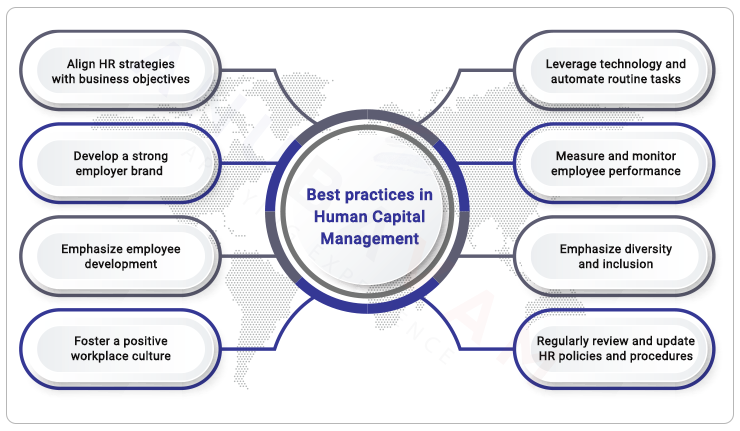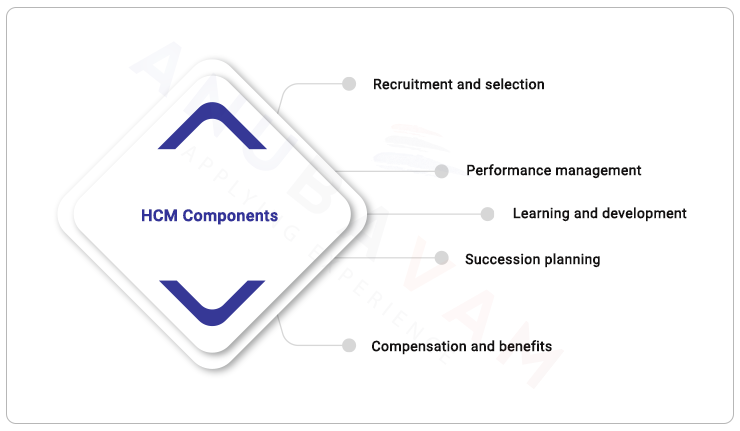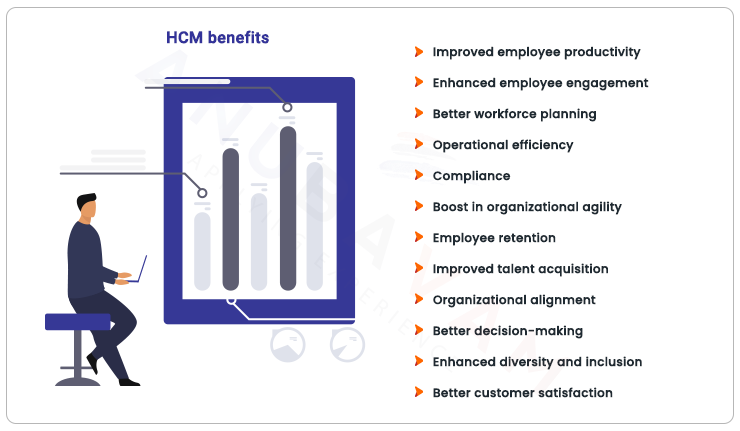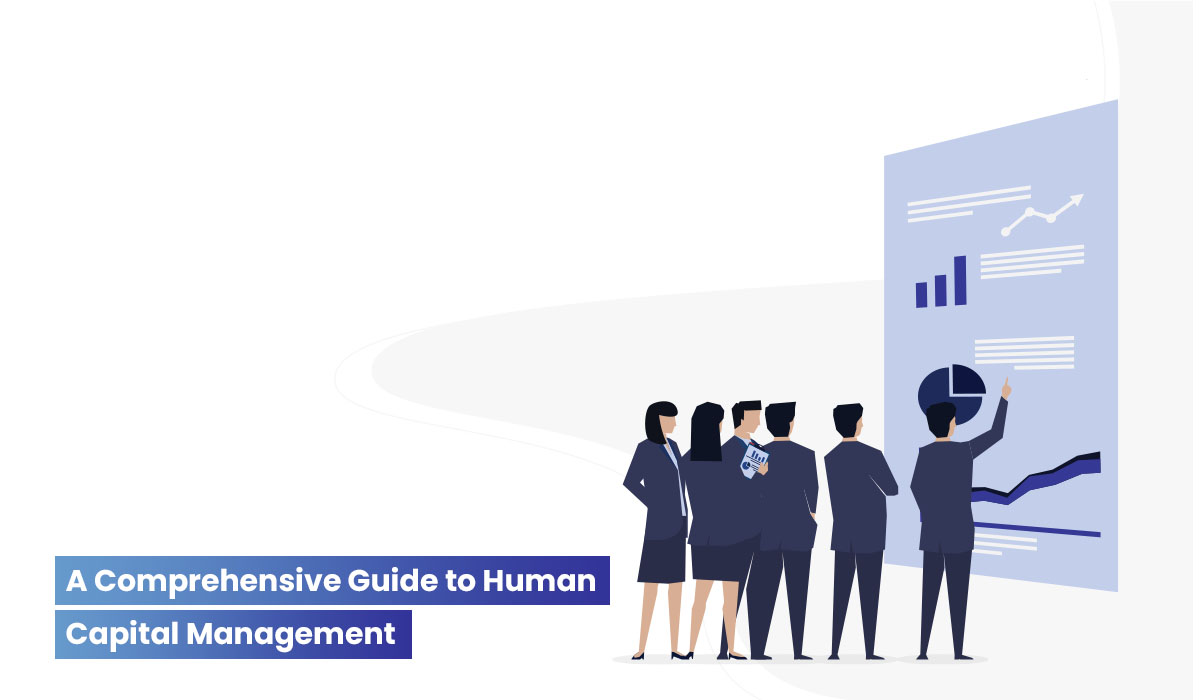In today's fast-paced business world, organizations must optimize their workforce to drive success and growth. Human capital management (HCM) is a critical process that allows businesses to effectively manage and utilize their most valuable asset: their employees. The process combines a medley of crucial activities like recruiting, developing, managing, and retaining employees to maximize their value and contribution to the organization.
We have tried to provide a comprehensive overview of HCM, including what are human capital management, its components, benefits, challenges, and best practices in this blog. We will also discuss how Anubavam Technologies' Human Capital Management software suite can help organizations overcome common HCM challenges and improve their overall HCM processes.
What is Human Capital Management (HCM)? Definition of HCM
Human Capital Management (HCM) is a strategic approach to managing an organization's most valuable asset: its people. HCM encompasses a wide range of processes, tools, and techniques that enable organizations to attract, develop, manage, and retain top talent to achieve their strategic objectives.
With a primary goal to create a high-performance workforce that is capable of driving long-term organizational success, HCM includes activities like recruitment and selection, performance management, learning and development, succession planning, and compensation and benefits. By effectively managing these processes, HCM can help organizations improve employee productivity, engagement, and retention, as well as align employee performance with business objectives.
Best practices in Human Capital Management
The HCM best practices can help organizations create a high-performance workforce, improve employee engagement and retention, and align HR strategies with business objectives.
We have figured out some of them for you here.

Components of Human Capital Management
The HCM encompasses a range of processes and activities that are designed to manage an organization's workforce effectively. However, the key components of HCM include

Recruitment and selection
This involves identifying the skills and qualities required for specific roles and finding the right candidates to fill those positions. Recruitment and selection may include activities such as job analysis, candidate screening, and interviews.
Performance management
This component of HCM focuses on setting clear expectations and goals for employees and providing feedback on their performance. Performance management may include activities such as goal setting, performance reviews, and performance improvement plans.
Learning and development
This component of HCM involve providing employees with the necessary training and development opportunities to improve their skills and knowledge. Learning and development may include activities such as training programs, coaching, and mentoring.
Succession planning
This involves identifying key positions within the organization and developing plans to ensure that there is a pipeline of qualified candidates to fill those roles. Succession planning may include activities such as talent reviews and leadership development programs.
Compensation and benefits
This component of HCM focuses on ensuring that employees are fairly compensated for their work and provided with appropriate benefits. Compensation and benefits may include activities such as salary reviews, incentive programs, and health insurance.
HCM Benefits

Another study by Gallup found that organizations with highly engaged employees have 21% higher profitability and 17% higher productivity compared to organizations with low employee engagement.
Effective Human Capital Management (HCM) is thus crucial to providing numerous benefits for organizations, including

Improved employee productivity
HCM provides employees with the necessary training and development opportunities, thereby improving employee skills and knowledge, leading to increased productivity and job performance.
Enhanced employee engagement
HCM can help organizations create a work environment that is conducive to employee engagement and job satisfaction. By offering opportunities for professional growth and development, recognizing and rewarding employee contributions, and fostering a positive workplace culture, organizations can improve employee engagement and retention.
Better workforce planning
HCM can help organizations identify skills gaps and develop strategies to address them, ensuring that they have the right talent in the right roles to meet business objectives.
Operational efficiency
By streamlining HR processes and utilizing technology to automate routine tasks, HCM can help organizations reduce administrative burdens and free up HR resources to focus on more strategic initiatives.
Compliance
HCM can help organizations ensure compliance with labor laws, regulations, and industry standards by providing tools and resources to manage compliance requirements and mitigate risk.
Boost in organizational agility
HCM can help organizations adapt quickly to changing business needs by ensuring that they have the right talent and skills to meet evolving demands.
Employee retention
By providing employees with opportunities for career development, recognizing and rewarding their contributions, and creating a positive work environment, organizations can improve employee retention and reduce turnover rates.
Improved talent acquisition
A strong HCM program can help organizations attract top talent by showcasing their commitment to employee development, offering competitive compensation and benefits, and creating a positive employer brand.
Organizational alignment
HCM can help align employee performance with organizational objectives by setting clear expectations, providing regular feedback, and aligning training and development opportunities with business needs.
Better decision-making
HCM provides HR leaders and managers with the data and insights they need to make informed decisions about talent management, including workforce planning, talent acquisition, and performance management.
Enhanced diversity and inclusion
HCM can help organizations create a more diverse and inclusive workplace by promoting diversity in recruitment, providing training on unconscious bias, and creating a culture of inclusion.
Better customer satisfaction
HCM can indirectly impact customer satisfaction by creating a high-performing workforce that is capable of delivering high-quality products and services.
Common Human Capital Management challenges
Human Capital Management (HCM) can be a challenging discipline due to the constantly evolving nature of the workforce and the complexity of managing people in a diverse and constantly changing business environment.
Some of the specific challenges that make HCM a tough discipline to master include:
- Finding and retaining top talent is a major challenge for organizations.
- Compliance with labor laws, regulations, and policies can be complex and time-consuming.
- Measuring and managing employee performance gets tough when there is a large workforce.
- Employee engagement can be challenging, especially if the organization lacks a strong culture or if employees do not feel valued.
- Managing payroll and compensation can be complex, especially challenging for organizations with a large workforce or multiple locations.
- Providing ongoing training and development opportunities without a centralized system can take hours of manhours.
- Tracking employee time and attendance.
- Analyzing workforce data can be a complex process.
How Anubavam's cloud HCM can help overcome these challenges?
Anubavam HCM suite of solutions offers several features and capabilities that can help organizations overcome common HCM challenges, including
A comprehensive talent management solution that helps organizations attract, hire, and retain top talent. It provides tools for job posting, resume parsing, candidate management, and onboarding to streamline the recruitment process and ensure that the best candidates are hired.
Compliance management tools help organizations stay up-to-date with labor laws, regulations, and policies. It provides alerts and notifications for upcoming compliance deadlines and offers features for tracking and managing compliance-related tasks.
Performance management solution that provides clear and measurable performance metrics and goals. It enables managers to provide feedback and coaching to employees and offers a tool for tracking and managing performance reviews.
Employee engagement platform that enables organizations to build a strong culture and keep employees engaged and motivated. It offers tools for recognition, feedback, and communication to foster a positive work environment and increase employee satisfaction.
Complete payroll and compensation management solution that streamlines the process of managing payroll and benefits. It offers features for tracking time and attendance, managing payroll processing, and providing benefits administration.
A learning management system that enables organizations to provide ongoing training and development opportunities to employees. It offers tools for creating and delivering courses, tracking progress and completion, and providing certification and compliance management.
Time and attendance solution that provides real-time tracking of employee time and attendance. It offers features for managing employee schedules, tracking time off requests, and generating reports for payroll processing.
Data analytics solution that enables organizations to make data-driven decisions about talent management. It offers features for tracking and analyzing HR data, providing reports and dashboards, and identifying trends and areas for improvement.
Final thoughts on the role of HCM in driving organizational success
HCM plays a critical role in driving organizational success by effectively managing employees, reducing costs, and improving overall business outcomes.
If you're looking to enhance your HCM processes, consider using the Anubavam Cloud HCM software suite. It is a cloud-based solution that comes with a wide range of features, is absolutely customizable, and has a user-friendly interface. It is one powerful tool for HR professionals looking to streamline their talent management processes, improve employee engagement, and make data-driven decisions about talent management.
Don't let HCM challenges hold your organization back - contact our team to take action today to enhance your HCM processes with Anubavam.
Related Articles
14 reasons why you should not ignore HCM software
Human resources cannot be replaced by technology. However, it can enable your team to complete more tasks quickly and effectively. With the appropriate HCM software, you can monito…
Read More →Subscribe to the Creatrix Blog
Fresh insights on higher education, straight to your inbox.
We respect your privacy.
Want to contribute?
We welcome thought leaders to share ideas and write for our blog.
Become a Guest Author →

